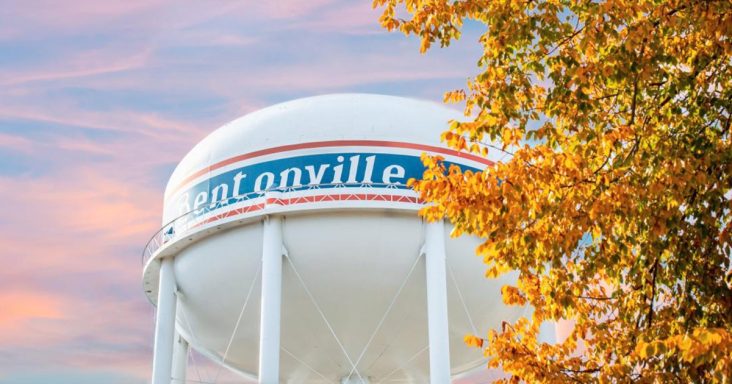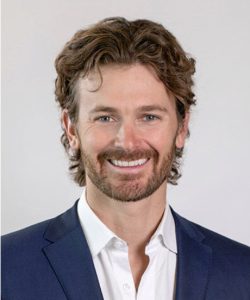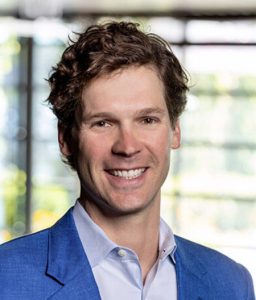Waltons say investing in Northwest Arkansas is a ‘long-term game’
by October 19, 2022 6:22 pm 12,021 views

Northwest Arkansas has been the cradle of entrepreneurship for more than 50 years, growing corporate giants like Walmart, Tyson Foods and J.B. Hunt Transport Services, according to Steuart Walton, co-founder of the Runway Group in Bentonville and grandson to Walmart founders Helen and Sam Walton.
Entrepreneurship in the heartland was a topic discussed Wednesday (Oct. 19) at the America Leads Idea Summit held in Bentonville at the Momentary.
Walton and his brother Tom, also co-founder of Runway Group and the chairman of the Walton Family Foundation Home Region, were joined by Steve Case, co-founder of AOL, who now runs venture capital group Revolution to discuss the importance of investing in entrepreneurship in the middle of the country. Elise Mitchell, founder of Mitchell Communications in Fayetteville, now the Dentsu Group, moderated the panel discussion.
“America itself was a startup some 250 years ago,” said Case, who also chairs the board for the Smithsonian Institute. “America almost failed, and plenty thought it would surely fail, but it survived and became the leader of the free world because we have the greatest economy in the world.”
INVESTING IN MIDDLE AMERICA
Case said 75% of the venture capital was being spent in three states: California, New York and Massachusetts and that left little for states like Arkansas and the rest of the middle of the country. That is why he started Revolution to invest in startups in places like Fayetteville and Detroit. Steuart said the impetus for his family’s ongoing investment in Bentonville and the region was to make Northwest Arkansas the best place to live, work and play.
“We want Bentonville to compete in the global arena, and we had to look at our best pitch. … Here, it is logistics and supply chain. We then had to try to perfect that. We also looked at what makes us unique, our natural amenities, and we have invested in trails and quality of life elements that are also paying big dividends,” he said.

The Runway Group is a venture capital firm that helps support startups and seeded some enterprises like the trails. Walton said that now there are 47 other companies that have sprung up around the biking trails.
Tom said philanthropy alone can’t create entrepreneurial ecosystems like what is emerging in Northwest Arkansas. He said it takes a shared vision and working with city governments, other businesses and stakeholders like the University of Arkansas.
The panelists also discussed the future of work and how it’s not just about recruiting businesses. It’s also about recruiting talent and building ecosystems through innovation districts. Case said there is still the need for clustering talent to some degree, but there is no reason that cannot be done in the middle of the country. Case said that when he started AOL in northern Virginia in the mid-1980s, only 3% of Americans were online and only one hour a week or so.

“Our mission became to get America online, and we did that. Recognizing opportunities among the challenges and then seizing those moments is essential. We had to go outside the state for capital, but it paid off,” Case said. “Today, that region is also home to dozens of other tech companies, including Amazon, that chose it for a second headquarters.”
He said Dell did a similar thing in Austin, Texas.
Steuart Walton said it’s crucial to figure out what works and then double down on it. He said Northwest Arkansas is also blessed to have business leaders reinvesting back in the area.
“Anytime you see that it’s a positive sign. We also have to remember it’s a long-term game,” he said.
Tom Walton agreed, saying it’s an iterative process. The brothers said there were times just five years ago they wondered if there would be enough opportunities in Northwest Arkansas to keep their interest, concluding that today that is not the case.
FUNDING ‘UNMET NEEDS’
Tom Walton said he did worry about complacency because that’s the quickest way to defeat. Case said the likes of Sears and cities like Detroit were on top of the world 30 years ago. He said cities and companies often fall from grace when leaders get complacent and satisfied with their standing. Case said there is always someone looking to disrupt the status quo, and finding the opportunities to invest in those businesses is a mission of Revolution.
He said Revolution has invested in 200 startups across mid-America, like Fayetteville-based AcreTrader, which offers a platform that allows farmers to raise capital by taking on investors who buy equity interests in the farmland. He said it made sense for the firm to locate in a rural state where there is plenty of farmland. He said the founder, Carter Malloy, was a venture capitalist from Silicon Valley but understood the importance of gaining the trust of farmers, so he moved that business to Fayetteville. It has grown to more than $100 million in revenue and 200 employees.
Other businesses funded by Revolution, like Stock X, an exchange for goods much like eBay but verifiable, started in a basement in Detroit with about a dozen people. The company has created 200 hundred jobs in downtown Detroit, an area that is once again coming back to life.
Mitchell asked the Waltons how they go about deciding where to invest money in the region. Steuart Walton said they literally drew a ring about the region on a map and looked at the tailwinds that benefit the area. They sought out potential stakeholders who might also partner on a shared vision.
“We want to help grow and start businesses in the region that solve unmet needs and present opportunities. We have invested in place-making and the concept of urban living in downtowns and some aviation ventures. Last year we invested in a solar energy startup because long-term we see solar as part of the energy independence solution. The cost has come way down, and apparently, Arkansas is the 9th or 10th most sunny state,” Steuart Walton said.
Tom Walton said the Runway Group’s north star is to help create the best version possible of Bentonville and surrounding towns.
“We don’t want to be Austin or Nashville. We want to be the best Bentonville we can be. We will die trying to make this the best place to live, work and play on the planet,” he said.
